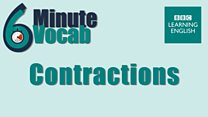Unit 11: English You Need
Exams, news, pronunciation, teachers' tips, learners' questions
Select a unit
- 1 English You Need
- 2 English You Need
- 3 English You Need
- 4 English You Need
- 5 English You Need
- 6 English You Need
- 7 English You Need
- 8 English You Need
- 9 English You Need
- 10 English You Need
- 11 English You Need
- 12 English You Need
- 13 English You Need
- 14 English You Need
- 15 English You Need
- 16 English You Need
- 17 English You Need
- 18 English You Need
- 19 English You Need
- 20 English You Need
- 21 English You Need
- 22 English You Need
- 23 English You Need
- 24 English You Need
- 25 English You Need
- 26 English You Need
- 27 English You Need
- 28 English You Need
- 29 English You Need
- 30 English You Need
Session 5
Learners' Questions
Welcome to Learners' Questions - the series where we answer your queries about the English language. What will this week's learner question be?
Activity 1
Learners' Questions
The causative
Dayra in Ecuador says: Can you help me, please. I don´t understand about the use of have + object + past participle.
Watch the video and complete the activity

Dan
Hi guys! Dan for BBC Learning English here with this week's Learner Question. Find out what it is after this.
OK! This week's learner question comes from Dayra in Ecuador, who says, can you help me, please? I don´t understand about the use of have + object + past participle. Well, well done for writing to us, Dayra. You can have the answer explained.
Have + object + the past participle is called the causative. And we use this structure when we arrange for someone else to do something for us. Consider this: I cut my hair yesterday versus I had my hair cut yesterday. In the first example, I did the action. I cut my hair myself. But, in the second sentence – like most people - I had somebody do this for me, because it’s quite difficult to cut your own hair, no?
There are lots of common every day actions that happen like this. For example, I had my car repaired. I had my nails done. I had my shirt cleaned. These are probably things that we pay for every day, but money doesn’t necessarily have to be involved.
This structure can be used in any tense. All we have to do is change the form of have. For example, I’m having my house repainted or tomorrow I’m going to have my dog walked. And in informal contexts we can replace have with get. For example, I’m getting my house repainted. There’s no difference in meaning.
Be careful. Context is very important. Consider the difference: I had my car repaired or I had my car stolen. The structures are exactly the same but the meaning is completely different. In the first one I paid someone to repair my car. I arranged this. But, in the second one, someone did this to me. I didn’t pay them to steal my car. That’s crazy!
I hope that answers your question Dayra. Thank you very much for writing to us. If anybody else out there has a question for Learners’ Questions, you can email us on: learning.english@bbc.co.uk. Please remember to put Learners’ Questions in the subject box and your name and the country where you’re from. We can’t answer every single one, guys, because we just get too many, but we do read all of them. And don’t forget to go to our website: bbclearningenglish.com. That’s it! I’ll see you next time on Learners’ Questions. Bye.
___________________________________________________________________
Did you like that? Why not try these?
___________________________________________________________________
Summary
The causative: have + object + past participle
Have + object + the past participle is called the causative. We use this structure when we arrange for someone else to do something for us.
I cut my hair yesterday - I did this action myself
I had my hair cut yesterday - I had somebody do this for me
Every day actions
There are lots of common every day actions that happen like this. These are probably things that we pay for every day, but money doesn’t necessarily have to be involved.
I had my car repaired.
I had my nails done.
I had my shirt cleaned.
Any Tense
This structure can be used in any tense - just change the form of have.
I’m having my house repainted
Tomorrow I’m going to have my dog walked
Informality
In informal contexts we can replace have with get with no difference in meaning.
I’m getting my house repainted.
Be careful
Context is very important. These structures are the same, but have very different meanings:
I had my car repaired - I paid someone to repair my car.
I had my car stolen - someone did this to me. I didn’t pay them to steal my car.
To do
Try our quiz to see what you've learned about this topic.
Learners’ Questions Quiz
4 Questions
Decide if these sentences are correct or incorrect
Help
Activity
Decide if these sentences are correct or incorrect
Hint
The formula is have + object + past participleQuestion 1 of 4
Help
Activity
Decide if these sentences are correct or incorrect
Hint
To change tense, change the form of have.Question 2 of 4
Help
Activity
Decide if these sentences are correct or incorrect
Hint
have + object + past participle means that you arrange for someone else to do something for you.Question 3 of 4
Help
Activity
Decide if these sentences are correct or incorrect
Hint
Can we use get instead of have?Question 4 of 4
Excellent! Great job! Bad luck! You scored:
End of Session 5
Well, that's it for this unit! Join us again in Unit 12 - Session 1 with Exam Skills - helping you get ready for that all important English exam.
Session Vocabulary
have + object + past participle
We use this structure when we arrange for someone else to do something for us.
This structure can be used in any tense - just change the form of have.
In informal contexts we can replace have with get.
Context is very important.


